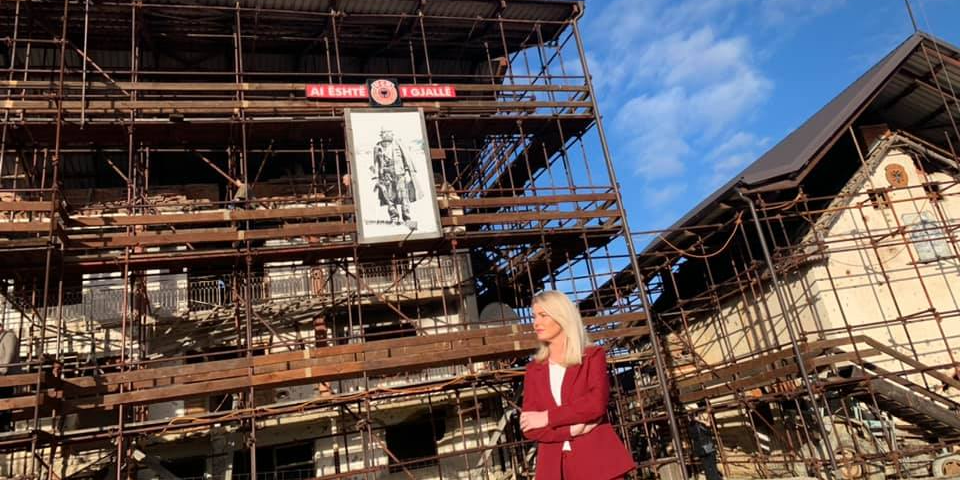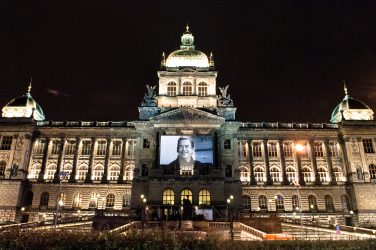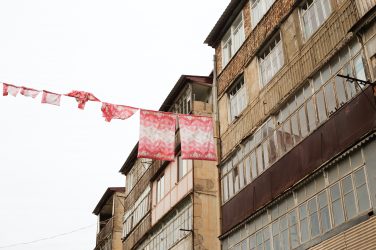Representations of women in war, particularly in media, often tend to be simplistic readings of their roles and positions in such contexts. In addition, state-centric and western approaches to war often fail to properly grasp the experiences of resistance among oppressed and colonised peoples, especially of those in guerrilla movements. E&M’s author Nisa Sherifi aims to share the lessons she learned on this topic after interviewing Mimoza Shala, a former guerrilla soldier of the Kosovo Liberation Army, who is currently a municipal deputy and political advisor in the city of Gjakova.
This series of articles seeks to capture and summarise some of the experiences of Mimoza Shala, a guerrilla soldier of the Kosovo Liberation Army during the 1998-1999 war, and a current municipal deputy and political advisor in the city of Gjakova. Neither this article nor Mimoza seek to draw out universal truths about women in war, women in guerilla movements, or even women in the Kosovo Liberation Army. Avoiding the trap of essentialisation or reductionism when dealing with such topics is both difficult and crucial.
Instead, this article draws out specific truths about Mimoza’s experiences and life first under Serbian colonisation and repression, and then during the war that followed in the late 1990s. It will offer a gendered view into the issue, which may shine light upon experiences shared by other women. However, elevating gender as the first and foremost dimension falls into a trap of white feminism that ignores realities of oppressed and colonized peoples, such as Mimoza and her compatriots were throughout their lives until liberation in 1999, and the 2008 declaration of Kosovo’s independence from Serbia. The experiences, motivations and realities of these women (and men) are therefore best captured by listening closely to what they have to say about it.
“I’m Mimoza Shala, I’m already 40, a mother of two sons, I’m a political activist, and in fact I try to defend human rights generally,” she introduces herself. “My post-war contribution has focused on social well-being and a better life in our country, and for the third time now I am a municipal deputy and political advisor in the city of Gjakova, which is where I was born and raised, and would not change it for the world, despite the fact I like traveling.”
During the war, Gjakova was one of the cities that suffered the most. Pre-war political repression was arguably worse than in many other cities, while during the war it witnessed a number of gruesome massacres, and to this day the city still claims the highest number of missing persons. A reason for this is Gjakova’s close geographic proximity to Albania, and its general commitment to liberation from Yugoslav-Serb colonisation and oppression and the Albanian national cause.
Mimoza joined the armed resistance at the young age of 16, during which time she turned 17. She describes her young self as a “lively, independent soul,” a child characterized by her parents as “not always listening to them,” who had a connection to nature and animals, but who was also, despite her “rebelliousness,” a brilliant student in primary school.
She enjoyed her time at school, until it was disrupted in 1989 by forces affecting her and all other Albanians in Kosovo. The introduction of anti-Albanian “violent measures” as they were called at the time started a period of apartheid that was to spread over Kosovo very quickly. Adding to existing financial difficulties, most Albanians working as civil servants and in public institutions lost their jobs starting in 1989, while the Albanian education system was dismantled.
Mimoza says that her generation is one that “neither managed to live out and finish their childhood, nor their youth.”
Mimoza says that her generation is one that “neither managed to live out and finish their childhood, nor their youth.” My own aunt and mother, who were similarly affected by these measures despite living in a different part of Kosovo, refer to this time as the “robbery of their childhood and youth.” Mimoza further insists that despite their young age, her peers and herself were forced to mature much faster to be able to grasp what was happening.
She rightfully asserts that her children, aged 19 and 21, despite “having both parents who had participated in the war,” are unable to truly imagine life during that period. Despite numerous conversations with my family and compatriots and the countless pages I have read about this time, I feel the same way.
What is more interesting is how when Mimoza explores her recollections, she often finds her own memories difficult to believe. “Sometimes it feels like a film,” she says over our zoom call, “as we experienced unprecedented violence. They made our life impossible, they rendered us to beings that simply breathe, and everything else was violence in every meaning of the word – physical, systematic, discriminatory, etc. We are the generation that experienced this.”
Yet, Mimoza makes sure to remind us of the incredible solidarity that developed among the people of Kosovo in that period. “Perhaps this great violence led us to extend our hands to one another; families didn’t really lack food, and they didn’t lack books,” she says. “A natural solidarity was created, which I think the best governments of the world fail to do today.”
The period she speaks of is that of the “Peaceful Resistance,” or as it is sometimes called, the “Gandhian Resistance of Kosovo,” during which Kosovo Albanians had committed to resisting the repression and colonisation by non-violent means. Clearly, this idea was eventually dropped, and the passage from peaceful to armed resistance is key when discussing and attempting to understand both her own motivations and the overall history of Kosovo, which are intimately linked.
“I emphasize this often, Nisa: I don’t like war, not today, not even at the time,” she maintains. “The issue is that I loved* life, I loved freedom, and I firmly believe that is what all of us wanted. Grabbing arms was imposed on us, it is all we had left to resist with,” she explains.
The shift came as the repression worsened and peaceful resistance lost any viability. “I emphasize this often, Nisa: I don’t like war, not today, not even at the time,” she maintains. “The issue is that I loved* life, I loved freedom, and I firmly believe that is what all of us wanted. Grabbing arms was imposed on us, it is all we had left to resist with,” she explains.
When recalling the 90s, she remembers how she was barred from attending high school as was her right; the high schools were closed down. She, like all Albanian high school students, had to wait for all the primary school students to finish their classes at the local primary school, in order to attend her community-organised high school classes, which as a result would run late into the evening. She explains that on the way back, she avoided taking any main roads because of potential torture and mistreatment by Serbian policemen, but also because of the local Serbs, who she says mistreated and assaulted her on past occasions.
Curfews barring you from leaving your doorstep, police breaking up private gatherings organised by the Albanian youth, beatings, and abuse were a reality that Mimoza described in detail during our conversation, a reality that I have heard from my mother, aunt, and many compatriots of these generations. “It was simply not a life, it was a sort of a large prison, where the guardians didn’t even treat you as they are supposed to in prisons, respecting some sort of rights,” she recalls. “Even our minimal rights, as people autochthonous to these lands, were not respected.” Words that echo realities of other oppressed peoples in their own lands, like Palestinians in Gaza.
“They made leaving our doorsteps impossible for us, but you weren’t safe even in your home either since they could come whenever they wanted and kill your parents, rape you, or do whatever they wanted to do,” she explains.
After all this, she passionately asserts that joining the Kosovo Liberation Army “at the time was freedom itself. It was simply life or death. Since they made living impossible, we chose to either die or live.”
After all this, she passionately asserts that joining the Kosovo Liberation Army “at the time was freedom itself. It was simply life or death. Since they made living impossible, we chose to either die or live.”
The necessity of sometimes passing from peaceful to armed resistance becomes quite clear not only to those who made this passage, but hopefully also to those learning about this period. However, before delving into the war experience, I felt it to be important to clarify at what moment Mimoza felt war truly began. From conversations, papers, studies and articles on this topic, emerges a very unclear timeline of the war in Kosovo. Defining the starting point of any war is difficult, but it is particularly hard in cases where said war is perceived as an “internal conflict” or as a “result of ethnic/civil unrest,” because the state-centric lens usually applies to the idea of war.
“For me, the war started at the moment I knew how to think; so, as difficult as it is to admit, it started when I became conscious and could remember things as a child,” Mimoza asserts. “When you grow up in an honest family, with honest parents, capable of doing everything, but you see them struggling to survive, you are at war. So, the mobilisation came later, but for me, the war started much earlier.”
“For me, the war started at the moment I knew how to think; so, as difficult as it is to admit, it started when I became conscious and could remember things as a child,” Mimoza asserts. “When you grow up in an honest family, with honest parents, capable of doing everything, but you see them struggling to survive, you are at war. So, the mobilisation came later, but for me, the war started much earlier.”
This was Mimoza’s path to armed resistance, and it is that of many others. The experience of the war itself will be explored in the next article.
*The verb Mimoza uses in this part of the interview is “me dashtë,” which in Albanian means to love, to like, and to want.
Pictures taken from Mimoza Shala’s Facebook page with her consent.












